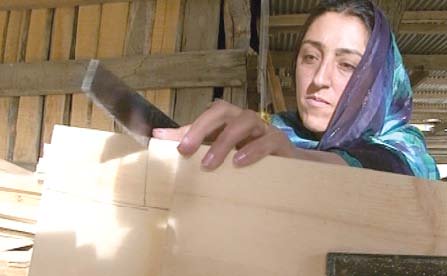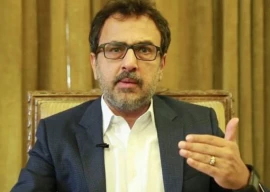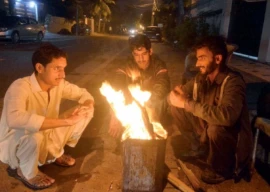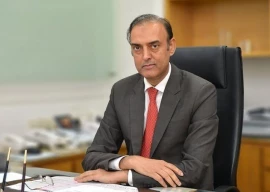
Nestled under the mountains of the scenic Hunza valley – a rare, utopic area in Gilgit-Baltistan that boasts a near perfect literacy rate – are two neat workshops, spread over two and a half canals of land.
This is the workspace Rubina turned to after completing her twelfth year of education and finding a severe lack of job opportunities. On her sister-in-law’s advice, she joined the 58 women that make up a carpentry group – one that has already produced orders worth Rs5 million during the last 6 months.
“Because of my work, I now have a sense of responsibility,” says the young Rubina. “I am happy.”
Carving out productive spaces
It was in 2003 that a pilot project known as Women Social Enterprise (WSE) was launched in Hunza. Under the Aga Khan Development Network (AKDN), it aimed to provide poor families income opportunities by professionally engaging young girls. With the passage of time, the WSE has expanded considerably and now employs over 110 women, between 19 and 35 years of age.
In the carpentry section, launched in 2008, most women earn around Rs8,000 per month, whereas the six master trainers get Rs20,000. The salary is in addition to the free pick-and-drop facility provided by the organization.

The larger of the two carpentry workshops has three rooms and some sheds, while the other one has six rooms, one being used as a ‘design lab’ with fully functional laptops.
“At any time, almost all 58 women are at work in the shops,” says Safiullah, a senior manager who heads Aga Khan Cultural Service Pakistan’s (AKCSP) Hunza office. “We are very organised. We have a good attendance system in place.”
Investing in women and sustainability
According to Salman Beg, the country head of the AKSCP, women development has long been an institutional priority for the AKDN.
“Today, we are seeing many women from G-B emerging as leaders in their respective fields,” remarks Beg. “The WSE is a unique attempt at providing marginalised women with what is considered non-traditional skills and trades.”
WSE was later named Ciqam, a word that translates to green in the local language and means ‘well-being’ across Hunza.
The partners who have assisted with the implementation of the project include the embassies of Norway, Finland and New Zealand in Islamabad, the World Bank and Jubilee General Insurance.
For girls like Rubina, this project has been life changing.
“It is a great pleasure to work with other colleagues, including the male trainers,” she exclaims. “Usually, I am home by 5 pm, although I can do overtime. From my work, I am able to contribute to my parents. My family members are very supportive, they’ve never discouraged me from working.”
Although Rubina is still an intern and not earning much as yet, she is more than satisfied with the opportunity.
“I am sure I can earn more money soon,” she says. “Right now, the experience and exposure is invaluable.”
Published in The Express Tribune, June 22nd, 2013.
COMMENTS (5)
Comments are moderated and generally will be posted if they are on-topic and not abusive.
For more information, please see our Comments FAQ

















Mr. Rashid Nadeem I have been working as a professional worker in Culture,Tourism and Heritage for over thirty years and I had worked four years at Baltit Fort Hunza as Manager.I also worked in social sector as head of an institution (HRSO) I shared insight story of one organization and had never blamed all AKDN institutions you should better check from these poor ladies at Altit Fort Hunza why they have to take a hammer in their hands instead other relatively Women matched work. It is a shame to that institution who earns millions of dollars from international agencies on the name of women empowerment for their own lavish expenses.
@shabbir Mir (Author) Can you ask ET to change the picture. It has a suppressive/depressive outlook and doesn't match your article. Have a look on my effort on the same topic. link text
@ikram baig i think you are one of those men who dont work ........ The work done by AKDN (aga khan develpment network) is renowned world over for effectiveness and poverty alleviation and social development.... and yes organisations are like human beings and no orgainsation is perfect there is always a room for betterment.... you can point out loop holes and they will try to imporve them
YAY THATS HUNZA MY HUNZA any thing is possible
No doubt some efforts are being made for women empowerment in Hunza through indulging them in different trainings and giving skills to earn their bread but in real situation in Hunza valley most of the women are under deprivation of human rights violations they are badly taken workers like donkeys, I have seen in Hunza women works in agriculture fields, carrying heavy loads on their backs and other physical hard work but on other hand men enjoys his status doing nothing mostly sitting in streets in gossips.
These NGO's who are propagating women empowerment in Hunza are actually using women in Hunza as a shield for fund raising from international donor agencies for their own lavish expenditures they spend more money on their own expenses than they pay to those poor women's on whom behalf they got millions of dollars.